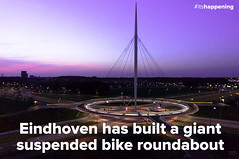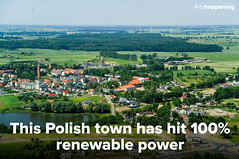Positive News | Positive News
Here's a recent piece:
Re-thinking our ‘built to fail’ society
30 SEP 2014
In-built obsolescence may seem a forgivable quirk of the modern technology many of us love, but it has a force of its own, placing us on a wheel of consumer slavery. But there is another way, writes Lucy Purdy
Brompton Bicycle aims to build its bicycles to last Photo © Brompton Bicycle
When I first heard of planned obsolescence – products being purposefully built to fail in order to fuel our buying more and more – I felt shock and disbelief. The concept was the very antithesis of the values I’d been brought up on by my dad, a skilled woodworker who had made a guitar and a clavichord from scratch, who had spent 18 months when I was younger, lovingly poring over the joints and cornices of an oak dresser. Pieces infused with expertise and care, built above all, to last.
But the story gradually came together for me. Members of planned obsolescence club range from the light bulb cartel of the 1920s who collectively decided to build their bulbs to fail more quickly, to the endless iterations of iPads, televisions and computers created and marketed today, creating a culture in which something more than 12 months old is worthy of being scoffed at and out-of-date. Or so we’re told. One of the pre-cartel light bulbs still shines in a fire station in Livermore, California, going strong after 112 years, a symbol of long-forgotten constancy completely at odds with our culture of trend and aspiration.
As James Wallman explored in his book Stuffocation, keeping people spending more and solving the problem of underconsumption became a key business focus, firstly in the US and then spreading quickly worldwide.
“A real estate agent in New York called Bernard London, in a pamphlet called Ending the Depression Through Planned Obsolescence,” he writes, “suggested that the government stimulate demand by defining the time any product was allowed to be used. It would work like the use-by date that comes with food.”
“Instead of passively consuming, by making, mending and caring for ‘stuff’, we can enter into a deeper and more fulfilling relationship with the world.”
The likes of Henry Ford, Wallman explains, first resisted these sorts of ideas, stating a proud intention that those purchasing his cars would “only ever have to buy one.” But in the face of competition from the likes of Chevrolet, even he gave in, beginning to change Ford’s styling each year, fuelling the very throwaway culture to which he’d expressed an ideological opposition.
“Instead of needing things because our old ones were broken, we learned to want them for reasons of fashion and aspiration,” Wallman writes, “awakening a consumer appetite that could never be satisfied.”
Hurtling around in the maelstrom of endless upgrades are cars, clothes, home furnishings and technology, even our bodies have become commoditised – ripe sources for dissatisfaction-fuelled spending through the likes of cosmetics and plastic surgery. All of these things, seemingly promising freedom and expression, crash together in the form of stuffed-to-bursting landfill sites, global warming and climate change, making us slaves to production, complicit in the destruction of our planet.
It seems we’ve all been there. I’ve wandered through the cosily-lit aisles of Ikea, taken, despite myself, by the display bedrooms, the throws and cushions in cute Scandi-style patterns and warm, wood tones. The stuff seems innocent and attractive, and it seems cheap. But after lugging it home the appeal wears off and a familiar sense of unease washes over me. I didn’t even need this. Is it really what I even wanted? Monetarily cheap it may be, but at what real cost? It’s this kind of consumption, worryingly habitual, which is helping price the earth into ecological collapse.
Like what you’re reading? Positive News depends on your support to publish quality inspiring content. Please donate to help us continue pioneering a more constructive news media.
The psychology prompting this sort of behaviour is key. Advertising works by triggering fear and dissatisfaction with what we have or who we are. As Wallman describes it: “It is like living in an immense, stomach-churning session of snakes and ladders, where the game never stops and where everybody is a competitor. To play this paranoia-inducing game – and it is a game we all play – millions of us spend our days and nights worrying about our place in the pecking order, and scheming to get up the ladders and avoid the snakes. The end result is millions suffering from material-focused status anxiety.”
But shifts do seem to be happening. The Restart Project, for example, is a London-based social enterprise which encourages and empowers people to use their electronics longer, by learning fundamental repair and maintenance skills. They cite their mission as: “fixing our relationship with electronics.”
Will Butler-Adams, managing director of Brompton Bicycles, spoke to me about trying to instil in his company the ‘build to last’ ethic. While other bike manufacturers – many of whom are now based in Taichung, Taiwan – save cash by employing the latest technical advances, Brompton has never opted for cheaper, off-the-shelf products, instead preferring to implement the best solution to any engineering challenge. More often than not, this means a slower and more expensive route.
“I think we had a propensity in the 80s and 90s to make and use incredibly cheap stuff,” says Butler-Adams. “Everything was cheap, from lamps to hi-fis, and when they broke you chucked them in the bin and bought another one. I mean, who cares right? As it happens, I just don’t tick like that. My great grandfather’s pocket watch sits in a little wooden holder in my desk and I wind it up every morning. I also have my grandfather’s ink pen on the desk which is probably from the 1930s. And I use those things every single day. They are beautifully made and they give me great pleasure and not only that, parts are still available to ensure you carry on using them.”
Neither of these products would have come cheap, but both are “extraordinarily good value,” insists Butler-Adams. And this isn’t about a dogged ‘doing the green thing’ approach, but one based on a natural and positive human response to ‘things’.
“My great grandfather’s pocket watch sits in a little wooden holder in my desk and I wind it up every morning. It is beautifully made.”
“Of course there’s an environmental benefit to using stuff for years, but there’s also an emotional benefit,” says Butler-Adams. “Like that old jacket: you’ve done stuff in it, you’ve been on journeys with it. And this is our philosophy, to do things really beautifully well, to refine them and take time getting the detail right and ultimately to create better value for the customer.”
A pamphlet published by Ruth Potts called The New Materialism: How falling in love with the world could help us all live more, with less, offers one way forward.
“Instead of passively consuming, by making, mending and caring for ‘stuff’, we can enter into a deeper and more fulfilling relationship with the world,” she writes. “One which is more rewarding, inherently low impact and socially just, since it also involves better sharing what we already have.”
It describes a shift from being passive consumers to members of a fulfilling ‘producer society’, seeking to roll back the gradual de-skilling we’ve undergone in the Western world, and returning to a society where everybody can “confidently boil an egg, stitch a garment or build a wall.”
Sharing, lending, bartering, swapping and gifting networks can all play a part and creating things can be done collaboratively and offer potential for shared social joy and human exuberance too.
This resonates with me. Whether it is growing, cooking or making, doing things myself and for myself, or for those I care for, I know therein lies abundant joy and satisfaction for the taking.
This resonates with me. Whether it is growing, cooking or making, doing things myself and for myself, or for those I care for, I know therein lies abundant joy and satisfaction for the taking.
“Don’t buy me anything, love,” said my dad when his birthday rolled around each year and I delved into my money box. Despite – or maybe because – knowing it would be a potato print card, a picture made from sticks, moss or leaves, or a lopsided, half-cooked cake, he said this with a gleam in his eye. Because he knew he was sharing a heartfelt, personal truth – the joy and meaning in crafting something and giving that to others.
“Make it!” he’d say.
This article was first published by Recycleopedia
Re-thinking our ‘built to fail’ society | Positive News
Explore a little further:
In this brilliant and original book, James Wallman explains and analyses why Stuffocation is the most pressing problem of our time -- and then goes in search of its solution. On the way, he goes down the halls of the Elysée Palace with Nicolas Sarkozy, up in a helicopter above Barbra Streisand's house on the California coast, and into the world of the original Mad Men.
Through fascinating characters and brilliantly told stories, Wallman introduces the innovators whose lifestyles provide clues to how we will all be living tomorrow, and he makes some of the world's most counterintuitive, radical, and worldchanging ideas feel inspiring -- and possible for us all.
James Wallman, "Stuffocation" | Talks at Google - YouTube
Stuffocation -- An Interview With James Wallman
Stuffocation | REVIEWS
RSA - Why We’ve Had Enough of Stuff
and:
The Restart Project
and:
Futures Forum: The Story of Stuff: "You cannot run a linear system on a finite planet indefinitely"
Futures Forum: The Circular Economy
Futures Forum: Jeremy Rifkin and the Collaborative Commons
.
.
.



